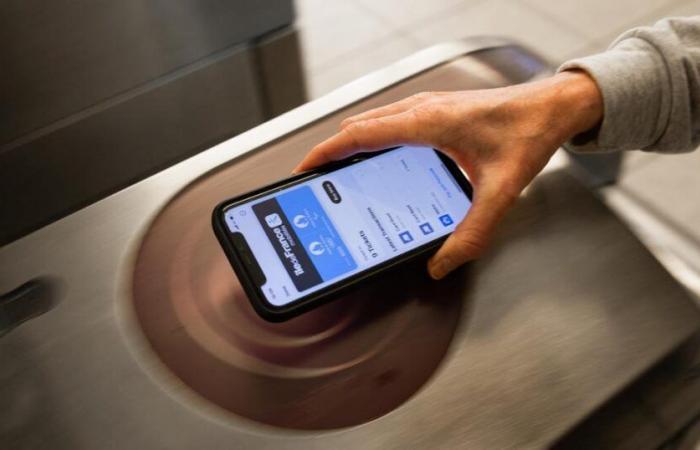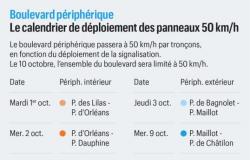Announced as the means to end “all sorts of traps and pricing injustices”, this simplification promises to be beneficial for many travelers. A “revolution” that is accompanied by several changes.
“We did not expect such a revolution”says Arnaud Bertrand, president of the Plus de trains user association, straight away, after the announcement of the implementation, from January 2, of a single fare for all public transport in Île-de-France. On that date, the ticket to take the metro, the RER or the Transilien will have a single price of 2.50 euros, while the ticket to take the bus or the tram will be sold at 2 euros. “A measure that is both ecological and social, which will help combat the social and territorial divisions in the region”justifies the president of the region and of Île-de-France Mobilités (IDFM) Valérie Pécresse this Wednesday.
For the elected representative from the Paris region, it is indeed a question of correcting numerous inequalities, while some occasional users sometimes found themselves having to buy two tickets. “origin-destination” to successfully complete their journey, to go from Melun to Marne-la-Vallée for example. That is twice 5 euros. “Every resident of the Paris region must have the same right to travel, at the same price”she continued, referring to a decision that is in line with history, since the introduction of the single Navigo pass in 2015. And to acknowledge: “Today we have incomprehensible price lists, with 50,000 different rates, which are totally unfair.”
Read the fileHousing, transport… What will France look like in 2039?
A single unit price
From January, the single metro/train/RER ticket at 2.50 euros will replace the t+ tickets and the tickets “origin-destination” whose prices ranged from 2.15 to 5 euros. The same goes for the single bus/tram ticket at 2 euros, compared to 2.15 euros. A new pricing “popular with 75% of travelers” questioned as part of a customer survey, IDFM stressed.
The latter, whose number is estimated at 4 million, will find themselves mostly winners. “Our objective: to strengthen the purchasing power of 3 million occasional travelers, to simplify their lives and encourage them to use public transport more, with a significantly lower ticket price for residents of the inner and outer suburbs and bus users.”. Only one million travelers will be forced to pay more, according to IDFM. Among them, Parisians who do not leave Paris, and all those who only take the metro, to the exclusion of any other mode of transport. They will pay 25 euros for 10 tickets instead of 17.35 euros.
A financial incentive for Freedom+
To counter this price increase, IDFM wants to extend the Liberté+ pass, which allows occasional users in the Paris region to use public transport by paying only for what they consume. And this, without having to take out their credit card, since they are then directly debited from their bank account every 15th of the month.
Until now, this solution only allowed you to take the metro and RER within Paris, it will be extended from January “to the whole of Île-de-France, with free connections”with “a 20% discount on the full price”. Either metro/train/RER tickets costing 1.99 euros and bus/tram tickets costing 1.60 euros. For Valérie Pécresse, this pass has thus “intended to become the pass for all occasional visitors to the Paris region”Note that in spring 2025, it will be possible to dematerialize it on smartphones.
And the whole revolution to come from this Liberté+ pass lies in the free transfers. Because the Parisian who would use a bus, a metro and/or a train to go from point A to point B will only pay 1.99 euros, compared to 4.50 euros if he does not have a pass (2 euros for the surface network ticket + 2.50 euros for the rail network ticket).
The end of the 10-ticket booklet
In return, this new pricing will mark the definitive end of the 10-ticket booklet. While it will still be possible to buy single-price tickets at ticket offices and vending machines, at least until December 2025, it will no longer be possible to obtain a discount when purchasing 10 tickets at once, as was the case before.
In concrete terms, it will only be possible to buy or top up up to 30 single-fare tickets on your Navigo Easy pass or directly on your smartphone via the app. For the modest sum of 75 euros, instead of 52.05 euros.
What offers are there for tourists?
“It will clearly be more expensive for them”notes Arnaud Bertrand. Foreign tourists and all those who do not live in Île-de-France will thus be forced to pay 2.50 euros for each of their journeys on the rail network. However, they will be able to benefit from other offers that could prove more advantageous for them depending on their travel.
First among these are two products: the Navigo day pass which will be sold for 12 euros (instead of 20.60 euros) and the Paris Visite single pass including access to airports for 29.90 euros. Finally, there will be an airport ticket, common to both airports departing from and arriving in the entire Île-de-France and all modes of transport combined, at a single rate of 13 euros (except for Orlyval, which will remain at the current rate conditions).
What offers are there for children?
The reduced rates – which already apply for children aged 4 to 9 or for holders of a large family card – will still apply. Including on a Liberté+ card. However, for children or adolescents who use public transport on a daily basis, the Imagine R junior (24.40 euros per year), school and student (374.40 euros) cards remain the most advantageous solution.
Also readRER, metro, Transilien… In Île-de-France, the price of a ticket will be capped at 2.50 euros from 2025
What about the price of the Navigo pass for subscribers?
“We will continue to have increases in the price of the Navigo pass every year, up to inflation + 1% maximum”agreed Valérie Pécresse this Wednesday, thus confirming a price increase for subscribers of up to 2.7% next January. An increase commonly accepted by user associations who prefer to have “extra revenue” And “enough to finance the construction of the Grand Paris Express”rather than seeing the revenues of Île-de-France Mobilités dry up.
On this subject, Valérie Pécresse defends a tariff simplification which would only have…“a theoretical cost of 30 million euros”a loss of revenue on IDFM’s 3 billion annual revenue, and which “would be completely offset by the modal shift from cars to public transport”. For the elected official, this new pricing could also be offset by an increase in attendance, a direct consequence of this simplification. And to ensure: “Thanks to these rates, we will have a real incentive to travel everywhere in Île-de-France”.






